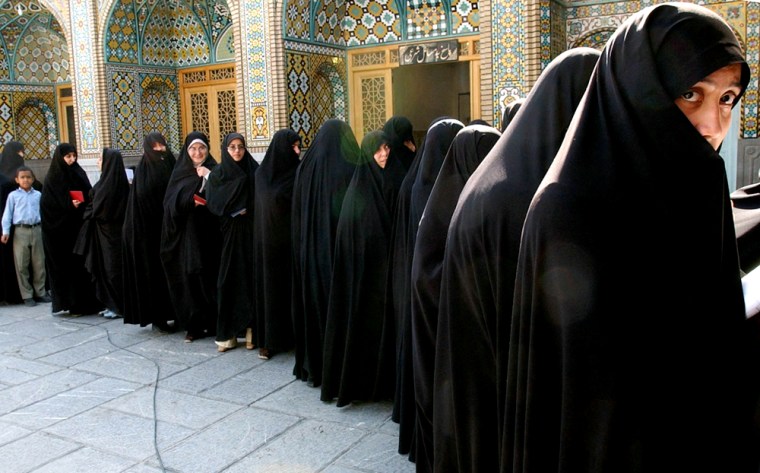TEHRAN, Iran — Iranians voted Friday in what was shaping up to be the closest presidential election since the 1979 Islamic revolution. The youth of the country were hoping to make their influence known — possibly by boycotting the balloting all together.
NBC News' Preston Mendenhall reports on the mood at the polls and the significance of the election from Tehran.
Can you describe the atmosphere of the elections in Iran today? Are people actually out voting? Or are many adhering to the opposition’s call to boycott the vote?
If the polls in Tehran are any indication, it appears that there is a sizable turnout. I can compare it to parliamentary elections that I covered in February 2004, where at 9 in the morning most of the polls were empty and people only filtered in later in the afternoon.
But today at 9 in the morning there were lines of 30 or 40 people deep at some polling stations that we saw. Then, it tapered off around lunchtime, but Iranian news has reported a high turnout and said that it is continuing into the evening.
There is still speculation that turnout could be lower than the conservative clerics who run the country would like. They see elections as a sign of the legitimacy of their government. That obviously comes in the face of President Bush’s criticism of the Iranian electoral process.
Can you explain the significance of the youth vote in this election?
More than 70 percent of Iran’s population is under the age of 30. Over the last eight years they have elected a reformer for two terms and were widely disappointed that the changes they hoped to see were not put in place.
That was largely because the outgoing President Mohammad Khatami faced significant obstacles and did not have the power to challenge the ruling clerics.
The presidency is one of the weakest arms of the government here. And the youth vote this year is expected to be significantly less. Many are apathetic and say that they don’t see a reason to vote if the president they are voting for cannot effect change.
Earlier, Ayatollah Hashemi Rafsanjani, who was president from 1989-97, was seen as the front-runner in this election. But now reformist Mostafa Moin seems to have gained ground and told supporters to ignore the boycott calls and turn out in large numbers. Has that call gained any traction?
The apparently significant turnout could be a result of Moin’s candidacy. He has been campaigning over the last several weeks really trying to get the youth vote, telling them that they should get out and vote no matter how disillusioned they are with the government process. He says that the reforms of President Khatami need to be continued.
Moin is a very respected figure among the students. During student clashes with the police in 2003, he stepped down from his post as a minister in President Khatami’s government in protest of the government’s lack of response to the beatings of students. For that he is held in high esteem by the youth movement.
However, he is not seen as a charismatic as President Khatami. So the speculation is that despite his popularity, he will not be able to rally enough support to defeat Rafsanjani, the conservative front runner.
Is there a certain sense of cynicism about the election? Are people really expecting any significant change as a result of the election?
Very few people are expecting change. Even if a conservative candidate does win the election, there have been significant changes in the way campaigning is done here.
That might be an indication that the mullahs understand that they have to change their ways in order to appeal to the youth population.
One of the most visible examples of that change has been the way that the campaigns have been run — with Western-style campaign tactics — very colorful and full of slogans.
Even the most conservative and hard line candidates are talking about democracy and reform. That’s a result of the eight years of stymied reform under Khatami. It shows that that they did have some effect on the ideologies of the revolutionaries who are still in charge of the country.
What was the reaction to President Bush’s comments regarding the election?
Certainly Iranian TV reported President Bush’s remarks yesterday when he criticized the legitimacy of Iran’s democracy. He said that because a senior council made up of six clerics and six judges decides who can run for president and they excluded many reformers and women this year.
But for Iranians, what the election really is about, are domestic issues. The economy has failed to keep pace with the growing population. Many Iranians are demanding fewer social restrictions in their lives.
One million Iranians are entering the job market every year. One minister recently estimated that Iran needs $20 billion in foreign investment every year for the next five years to employ the people coming onto the job market. Iran’s isolation from the rest of the rest of the world, economically and politically, is preventing that.
